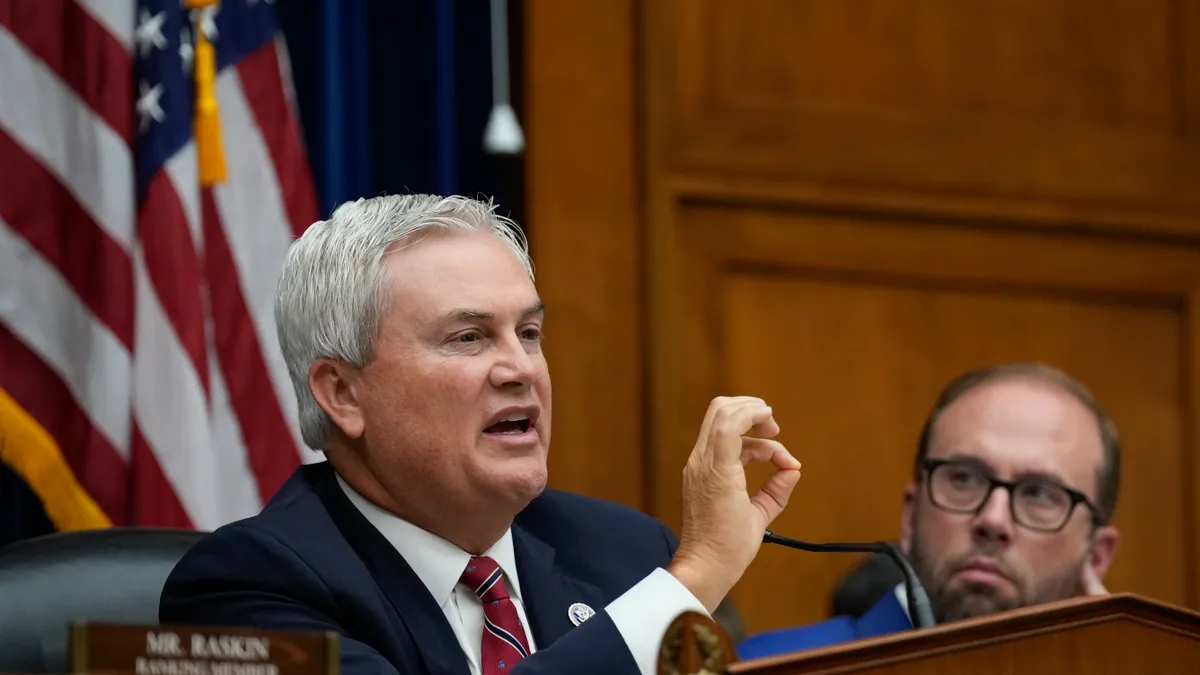Dive Brief:
- Republicans on the House Oversight and Government Reform Committee have called on eight environmental organizations that received grants from the U.S. Environmental Protection Agency to submit documents, communications and other internal records related to the funding they received.
- The probe, announced Thursday, is spearheaded by Committee Chair James Comer and seeks to investigate the funding disbursed to recipients under the Biden administration’s EPA, including grants from the Greenhouse Gas Reduction Fund. The $27 billion fund was established as part of the 2022 Inflation Reduction Act, the former president’s landmark climate law.
- Comer said in his March 27 letters that the committee is “examining potential entanglements or conflicts of interests” between the environmental nonprofits and the Biden administration’s EPA. All eight groups received grants collectively worth $20 billion from the GGRF — a financial commitment Republicans have dubbed an “unprecedented arrangement.”
Dive Insight:
Comer sent letters to Climate United, Coalition for Green Capital, Power Forward Communities, Opportunity Finance Network, Inclusiv, Justice Climate Fund, Appalachian Community Capital and Native CDFI Network on Thursday.
The letters requested that all eight groups provide information on employees, salaries and communication that took place between them and the former EPA administration related to GGRF grants by April 10.
Earlier this month, the EPA — under Trump-nominated Lee Zeldin — froze access to the $20 billion grants committed through the GGRF, leaving recipients in a precarious financial situation. Climate United Fund, a grantee and one of the eight organizations that received a letter from Comer Thursday, said at the time the abrupt halt on funding impacted its ability to make payroll for employees and disburse funding to its contracted borrowers.
In his March 3 letter to the EPA’s Acting Inspector General Nicole Murley, Zeldin said the structure of the IRA-backed fund was fraudulent and made allegations of malfeasance or mismanagement related to the GGRF. The EPA administrator said recent findings pointed to “astonishing sums of tax dollars awarded to unqualified recipients, and severe deficiencies in regulatory oversight under the prior administration.”
Shortly after, Climate United Bank filed a lawsuit against the EPA and Citibank — the financial institution tasked with disbursing the funds — over blocking its access to the $6.97 billion it had been awarded through the GGRF grant. The climate nonprofit alleged in its suit that the funding freeze violated the Administrative Procedure Act. The Coalition for Green Capital followed with a lawsuit against Citibank two days later, alleging the bank was violating its contractual obligations by blocking the $5 billion CGC had been awarded.
Last week, a federal judge issued an order blocking the EPA’s freeze order on GGRF grants, finding that the EPA did not provide sufficient evidence of waste, fraud or abuse.
The Oversight Committee chair’s probe builds on a broader investigation House Republicans have launched against ESG and sustainability in recent years. Last year, Comer sent a letter to the Internal Revenue Service, requesting insight into how the agency ensured state pension funds performed their fiduciary duty and did not violate provisions of the U.S. tax code requiring them to invest for the “exclusive benefit of their enrollees.” The letter alleged that funds that have incorporated ESG factors into their frameworks and some state pension funds’ investment decisions had deviated from the “exclusive benefit provision.”
Prior to that, the Kentucky lawmaker targeted the Federal Reserve, asking its general counsel to provide additional information on whether its membership of ESG and climate-focused coalitions violated federal laws defined under the Bank Holding Company Act, Home Owners Loan Act or the Change in Bank Control Act. The Fed has since left a climate coalition for global central banks.












